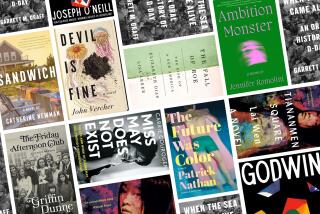True believer
- Share via
THERE’S no one quite like Anne Lamott. She’s an irreverent, civil liberties-minded late convert to Christianity who found Jesus after years of drinking and drug-taking in the bohemian outback of Marin County. A vocal opponent of Republican politics, she’s also a single mother whose son, Sam, now a teenager, has been a presence in her writing since his birth (more recently with his permission, she notes). Clearly, Lamott is not your typical Christian writer. As she often points out, you won’t find her work in Christian bookstores since she swears too much and talks about Jesus as if he’s her oldest friend. (She once said, “Jesus drinks himself to sleep when I trash Republicans.”)
Nevertheless, Lamott appeals to many Christians and atheists alike. With her edgy humor and a storytelling style rooted in the nitty-gritty of daily life (a child’s fear of dogs, her car breaking down) and an ability to lasso larger topics along the way (the war in Iraq, AIDS, alcoholism, Alzheimer’s disease), she rarely sounds portentous or dogmatic. Certainly her religion is woven into every piece, but she doesn’t beat the reader over the head with it. She chats about Bible stories in the same way she rhapsodizes about apple fritters.
The central concerns of “Grace (Eventually)” aren’t much different from those in her two earlier books of essays, “Traveling Mercies” and “Plan B,” except that Lamott and her son are a little older, and so her perspective on aging, teenage behavior and other issues has shifted slightly. As in those previous collections, most of the pieces focus on Lamott’s ordinary daily life, such as the rewards and difficulties of working with kids in Sunday school or volunteering to help run a special education dance class, or those wispy moments that barely register, like the aftermath of a belated jump off a ski lift, a briefly lost dog, a taxi driver who doesn’t know the way. They are stories about the lived experience of faith, little steppingstones to what Lamott calls “grace” -- what secular types like me might call a hard-won sense of being at peace with oneself and the rest of the world.
I had the same initial reaction to this book that I always have to Lamott’s work. I began with a suspicion that her pieces were going to be too obvious, too sentimental, and then found myself suddenly disarmed by an unexpected turn of phrase, a flash of humor or a psychological insight. “A Field Theory of Beauty” lifts off with an extended comic riff on her increasingly wrinkled neck, the “neckage” of female middle age. Ultimately, she says, “joy is the best makeup. Joy, and good lighting.” Of course, she’s right. And she accurately pinpoints a common, middle-aged female discomfort/delusion that if it weren’t for the neck, one might look 18. But it’s throwaway phrases like “good lighting” that deflate looming cliches and underscore the freshness of her writing.
Lamott has always had her critics. She’s berated for self-indulgence or narcissism, or exploiting her family for good copy, or shallowness (she makes everything funny). And of course, there’s the religious fundamentalist complaint about her lack of reverence for the Lord. Worse, one critic said that her faith was “simplistic,” a charge that made her wonder for “half a day” if she should come up with a “more East Coast kind of happening, intellectual faith,” as she put it in a PBS interview last year. “And then, I don’t know, I took a nap or something, and that passed.”
Certainly, some of the charges against Lamott seem unfair. Narcissistic? Like ... Hegel? Emily Dickinson? Yes, there are many “I’s” on the page. But one has to look a little more closely. Her stories may often sound like frivolous internal monologues, but Lamott is after bigger fish -- even though “Grace (Eventually)” doesn’t stack up next to her earlier works. Some of the pieces seem unnecessarily drawn out, the taxi ride for one, in which the intended suspense just drags on to no purpose. Too many stories have lyrical endings that simply seem tacked on. And I miss the allusions and manic hilarity of some her earlier pieces.
Of course, it’s hard to be funny about some topics -- like a friend’s assisted suicide, for example. Although she scrapes together a successful essay (in a literary sense, I mean) by using detailed description -- most notably about crushing pills and mashing them into apple sauce in a “tiny Asian bowl” -- it’s an odd mix of sentimentality and Victorian gothic.
In Lamott’s best work, humor strengthens whatever serious point she’s trying to make. In weaker pieces, the lighthearted approach sometimes suggests avoidance. A story about her friend’s difficult husband (certainly a tough assignment!) just skitters over the surface as it heads firmly toward the conclusion that there’s love even in selfish behavior. Somehow that seems to be pushing it. Still, she’s never afraid to flail around or sound silly. More important, she manages to suggest that she’s your ally, the funny best friend who knows instinctively that you’ve had these troubles too. And perhaps that’s why readers continue to find something fresh in everything she has to say.
I can’t help thinking that one of her fans said it best. After an angry online letter from a 26-year-old about a Salon.com column in which Lamott agonizes about slapping her son in a moment of anger -- one of the better pieces, slightly rewritten, in “Grace (Eventually)” -- a woman called Sara wrote to say that as a mother she understood Lamott’s driven-to-the-edge response only too well. “For some of us,” she said, Lamott’s writing is “nothing less than salvation.... Knowing that Lamott has the courage to share her struggles with us, with me, makes me so grateful I could cry. Ease up, Critics, I need this.” Perhaps, secretly, we all do. *
More to Read
Sign up for our Book Club newsletter
Get the latest news, events and more from the Los Angeles Times Book Club, and help us get L.A. reading and talking.
You may occasionally receive promotional content from the Los Angeles Times.






